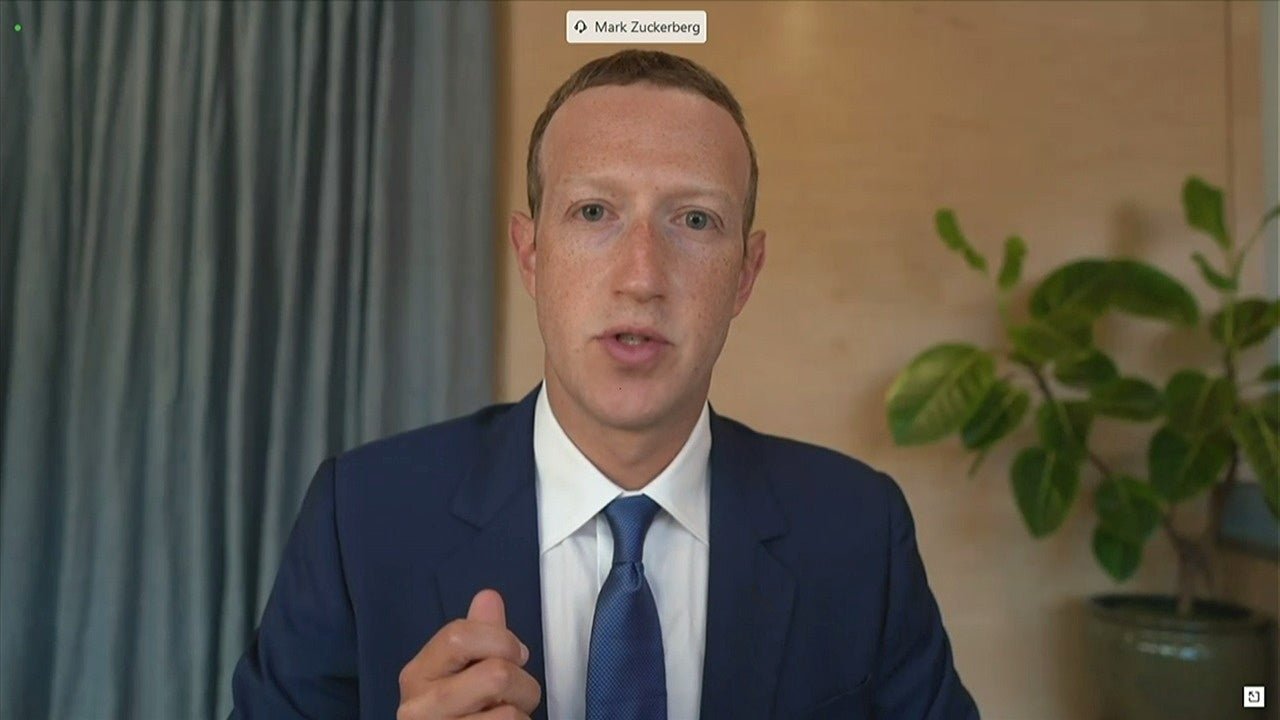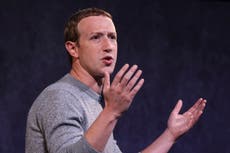Mark Zuckerberg threatened to shift Facebook investment away from UK, papers reveal
Matt Hancock told social media boss in private meeting he wanted a shift in government tone on internet policy

Your support helps us to tell the story
From reproductive rights to climate change to Big Tech, The Independent is on the ground when the story is developing. Whether it's investigating the financials of Elon Musk's pro-Trump PAC or producing our latest documentary, 'The A Word', which shines a light on the American women fighting for reproductive rights, we know how important it is to parse out the facts from the messaging.
At such a critical moment in US history, we need reporters on the ground. Your donation allows us to keep sending journalists to speak to both sides of the story.
The Independent is trusted by Americans across the entire political spectrum. And unlike many other quality news outlets, we choose not to lock Americans out of our reporting and analysis with paywalls. We believe quality journalism should be available to everyone, paid for by those who can afford it.
Your support makes all the difference.Matt Hancock told Mark Zuckerberg in a private meeting that he wanted to shift the government’s approach to big tech companies, after the Facebook boss threatened to pull investment out of the UK.
Details of the meeting, which took place in 2018 when Mr Hancock was culture secretary with responsibility for social media regulation, are contained in official papers released to the Bureau of Investigative Journalism (BIJ) following a lengthy freedom of information battle.
According to the notes of the meeting taken by the Department for Digital, Culture, Media and Sport, Mr Hancock told the Facebook boss that he wanted to shift the government’s tone from being one of “threatening regulation” towards an approach of “encouraging collaborative working to ensure legislation is proportionate and innovation-friendly”.
The meeting, at a technology conference in Paris, came days after Mr Hancock had denounced Mr Zuckerberg for resisting demands from the House of Commons Culture Committee to give evidence to its inquiry into fake news.
Shortly before, the UK government had announced new legislation on internet safety.
The Facebook CEO spoke of an “anti-tech” government in London and joked that Britain might become one of the only two countries he could not visit – the other presumably being China.
And the note recorded that he “said the UK was the obvious territory in Europe for them to invest in, but they are now considering looking elsewhere”.
Mr Hancock sought “increased dialogue” with Zuckerberg, “so he can bring forward the message that he has support from Facebook at the highest level”, said the DCMS minutes.
The next month, Hancock had a follow-up meeting with Elliot Schrage, then Facebook’s top lobbyist, who later wrote thanking him for setting out his thinking on “how we can work together on building a model for sensible co-regulation on online safety issues”.
Mr Schrage also stated that the “challenges of online safety” should be “achieved in a constructive and collaborative way”, before signing off by saying Facebook was close to providing an update on its “commitment to London”.
The document showed that it took “several days of wrangling” by DCMS to persuade Mr Zuckerberg to take part in the meeting, and that Facebook had to be given explicit assurances that Mr Hancock wanted a “positive meeting” and would not simply use it to repeat demands for the tech boss to appear before MPs.
Former Commons Culture Committee chair Damian Collins said: “The context of Mark Zuckerberg’s 2018 meeting with Matt Hancock was that it was two months after the Cambridge Analytica scandal had broken and Mark Zuckerberg was refusing our requests for him to appear before the committee to discuss it.
“The notes from this meeting clearly show that Mark Zuckerberg was running scared of the DCMS committee investigation on disinformation and fake news and was actively seeking to avoid being questioned by us about what he knew and when about the Cambridge Analytica scandal.
“It shows how afraid Mark Zuckerberg is of scrutiny that Facebook saw questions about the safety of users’ data on their platform and how they worked with Cambridge Analytica as an ‘anti-tech’ agenda. I’d be happy to discuss this with Mark Zuckerberg on Facebook Live anytime.”
The committee’s current chair, Julian Knight, said: “Two years ago, when parliament was seeking to hold Facebook to account, we now know that the government was holding its own private talks with Mark Zuckerberg.
“Numerous invitations to appear before our predecessor DCMS Committee in its investigation into fake news went unanswered by him. It is of concern, that as has been reported, he met the then DCMS Secretary of State to express concerns about the tone of overnment policy towards online regulation.“We are looking forward to seeing the government’s long-awaited online harms legislation in the coming weeks.”
The minutes also reveal that Mr Hancock was due to visit Facebook in September 2018, but in the event this did not take place as he was moved to the Department of Health.
The BIJ initially requested notes from the meeting in November 2018, and fought a long freedom of information battle to secure their release.
Reporter Matthew Chapman said: “Matt Hancock’s obsequious dealings with Mark Zuckerberg are more like those of a flunkey of Facebook rather than a government minister in charge of regulating big tech.
“It has been a bitter struggle to discover what was discussed at the meeting. The government has gone to great lengths to cover up a discussion that has far-reaching implications for British society and democracy. The entire process raises serious questions about transparency within government and the deference it shows technology companies.”
Erin Alcock of the BIJ’s lawyers Leigh Day said: “The public should know what their government is discussing with powerful individuals and organisations such as Facebook and whether their government is working to protect the rights of individuals over their own data, and their safety and security online.”
A Facebook spokesman said: “Facebook has long said we need new regulations to set high standards across the internet. In fact last year Mark Zuckerberg called on governments to establish new rules around harmful content, privacy, data portability, and election integrity.
“The UK is our largest engineering hub outside of the US and just this year we created 1,000 new roles in the country.”
A DCMS spokesperson said: "We are completely committed to tackling online harms and have set out tough, world-leading proposals that will make the internet safer for UK citizens. We will outline full details on plans for new regulations imminently that will include tough sanctions for digital firms who do not step up in a fair and proportionate approach."




Join our commenting forum
Join thought-provoking conversations, follow other Independent readers and see their replies
Comments